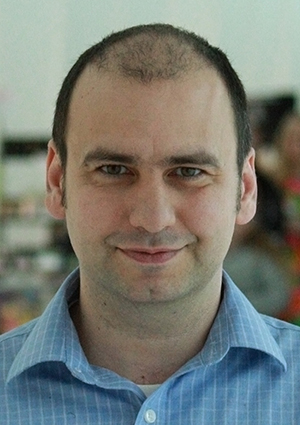
Ionel Popa
Website: http://popalab.uwm.edu
Research
Proteins are the work-horse of our cells, and, at molecular level, take part in essentially every aspect of life: are the building blocks of cells, catalyze biochemical reactions or store and release energy. My lab combines protein engineering, surface functionalization and computer programming with instrument development to pursue two main and inter-connected areas of research: how the mechanical response of proteins is related to their function (related to molecular biophysics) and how to design protein hydrogels as smart materials (related to soft condensed matter).
- Single molecule protein mechanics
Force is a natural perturbation which proteins in our body experience all the time. My laboratory uses a technique based on single molecule magnetic tweezers and covalent attachment to study the unfolding kinetics of proteins under force and their relation to cancer, muscle dystrophy or inflammatory diseases. This technique, has the unique advantage of being able to tether single molecules at physiologically relevant forces (1-120 pN) for extreme periods of time (up to 15 days for a single molecule). Most biological processes happen on the seconds-to-minutes time scale and the magnetic tweezers approach used in my laboratory can capture these ‘long’ time scales as it tethers single proteins under a broad range of mechanical perturbations. - Smart materials based on protein-hydrogels
Biomimetic materials hold the promise of revolutionizing medicine by allowing for artificial organs and targeted drug release. We use engineered proteins to obtain protein-hydrogels, which are a new type of material with unique properties. We currently make protein hydrogels by chemically crosslinking pure proteins. These amorphous materials can harvest from the biodiversity of proteins, while retaining large amounts of water (>90%), have a unique response to mechanical stress through the unfolding of the constituent protein domains and can respond to various stimuli. With these materials, we aim to advance the fields of smart materials and soft biorobotics.
Biographical Sketch
Ionel Popa received his B.Sc. degree in Chemical Engineering from Gh. Asachi Technical University in 2005 and his Ph.D. in Physical and Analytical Chemistry from University of Geneva in 2010, under the direction of Prof. Michal Borkovec. He then joined the group of Julio M. Fernandez at Columbia University to study protein biophysics, where he held the positions of Postdoctoral Fellow and Associate Research Scientist. Since fall 2015, he joined the University of Wisconsin-Milwaukee, where he currently holds the rank of Assistant Professor.